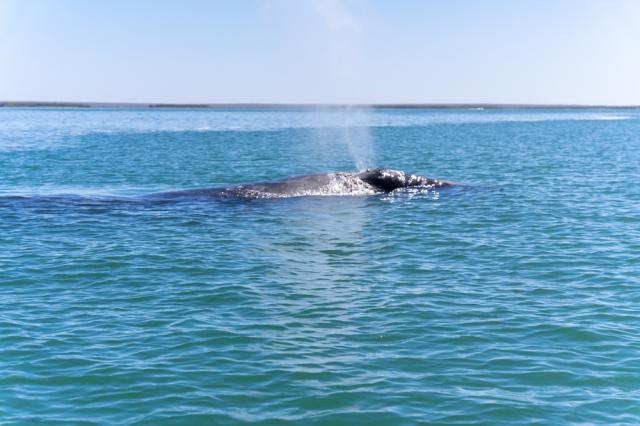
The Bureau of Ocean Energy Management (BOEM) today released a Notice to Lessees and Operators (NTL) providing recommendations to voluntary precautionary measures for the protection of the Rice’s whales in the Gulf of Mexico. (Source: Shutterstock.com)
The Bureau of Ocean Energy Management (BOEM) today released a Notice to Lessees and Operators (NTL) providing recommendations to voluntary precautionary measures for the protection of the Rice’s whales in the Gulf of Mexico. The NTL will remain in effect during the period when BOEM and the Bureau of Safety and Environmental Enforcement (BSEE) are engaged in reinitiated consultation with the National Marine Fisheries Service on the 2020 Biological Opinion.
These recommendations apply to the area comprising the northern Gulf of Mexico Outer Continental Shelf. This section was chosen based on recent third-party, scientific information indicating that Rice’s whale may appear in the area.
The recommended voluntary measures within this area include: training visual observers to monitor the vessel for strike avoidance, documenting and retaining records for three years on details of transit and using an automatic identification system onboard all vessels 65 feet or greater that are engaged in oil and gas activity.
Other measures include all vessels engaged in oil and gas activities, regardless of size, maintain a 500-meter distance from Rice’s whales and maintain a speed of 10-knots or less. It is also recommended that vessels avoid transit through the area after dusk and before dawn.
While the NTL is aimed to protect marine life in the area, it is not without its critics however, as Erik Milito, president of National Ocean Industries Association (NOIA), stands in opposition to BOEM’s decision.
“The NTL, coupled with the broader Stipulated Stay Agreement, poses a barrier to America's energy production capabilities within a region that not only sustains hundreds of thousands of high-paying jobs but also yields some of the world's least carbon-intensive barrels,” Milito said in a press release. “Despite lacking ample scientific evidence to support such extensive bans on operations, the agreement targets the domestic offshore oil and gas industry. The Stipulated Stay agreement ignores the best science, contravenes Congress' explicit directives in enacting the Inflation Reduction Act, and threatens America's energy independence.”
Milito is worried that the speed restrictions, prohibition of nighttime transit and preventing travel in certain areas will impact the industry’s ability to explore and develop new energy projects in the Gulf. He also believes that the “restricted pathway” that has been imposed will lead to more traffic and more emissions, as when and where transit can occur will be greatly limited.
The recommendations do not apply when compliance would place the safety of the vessel or crew, or the safety of life at sea, in doubt. BOEM recommends that the operators and lessees document their implementation of all measures across the Expanded Rice’s Whale Area.
Recommended Reading
Top Exxon Directors Cruise to Re-election Despite Activist Opposition
2024-05-29 - The campaign amounted to a test of whether top fund firms would rally to defend the small shareholders whose resolutions have put topics like the environment and workforce diversity at the center of many corporate annual meetings.
Energy Capital Partners Raises $6.7B, Buys Atlantica
2024-05-29 - The New Jersey-headquartered Energy Capital Partners said its ECP V (Fund V) secured capital commitments of $4.4 billion plus an additional $2.3 billion of co-investment capital; the private equity firm also announced a $2.6 billion take-private of Atlantica Sustainable Infrastructure.
Hess Shareholders Approve Chevron Merger
2024-05-28 - Hess Corp. stockholders voted in favor of the company’s merger with Chevron Corp. during Hess’ May 28 special meeting.
Permian Resources Completes Liquidation of Canada’s Lynden Energy
2024-05-28 - Permian Resources said the liquidation of Lynden Energy, a subsidiary of Earthstone Energy, will simplify its corporate structure and reduce go-forward tax obligations at the time of the Earthstone acquisition.
Earthstone’s Anderson Relaunches, Seeks Conventional
2024-05-24 - The new E&P PetroPeak Energy will also take a look at unconventional property in the Eagle Ford and Austin Chalk.




